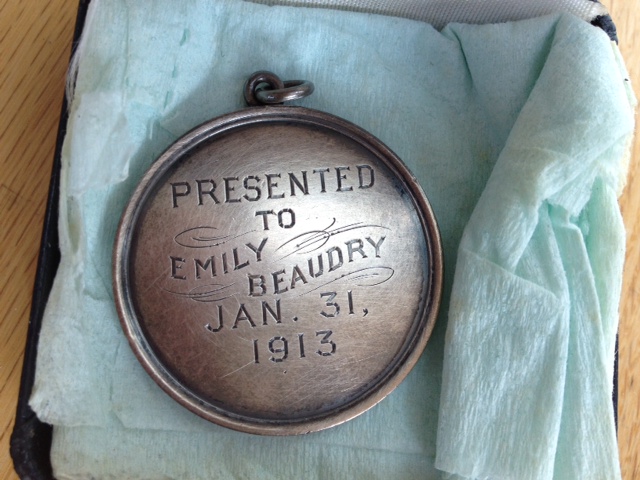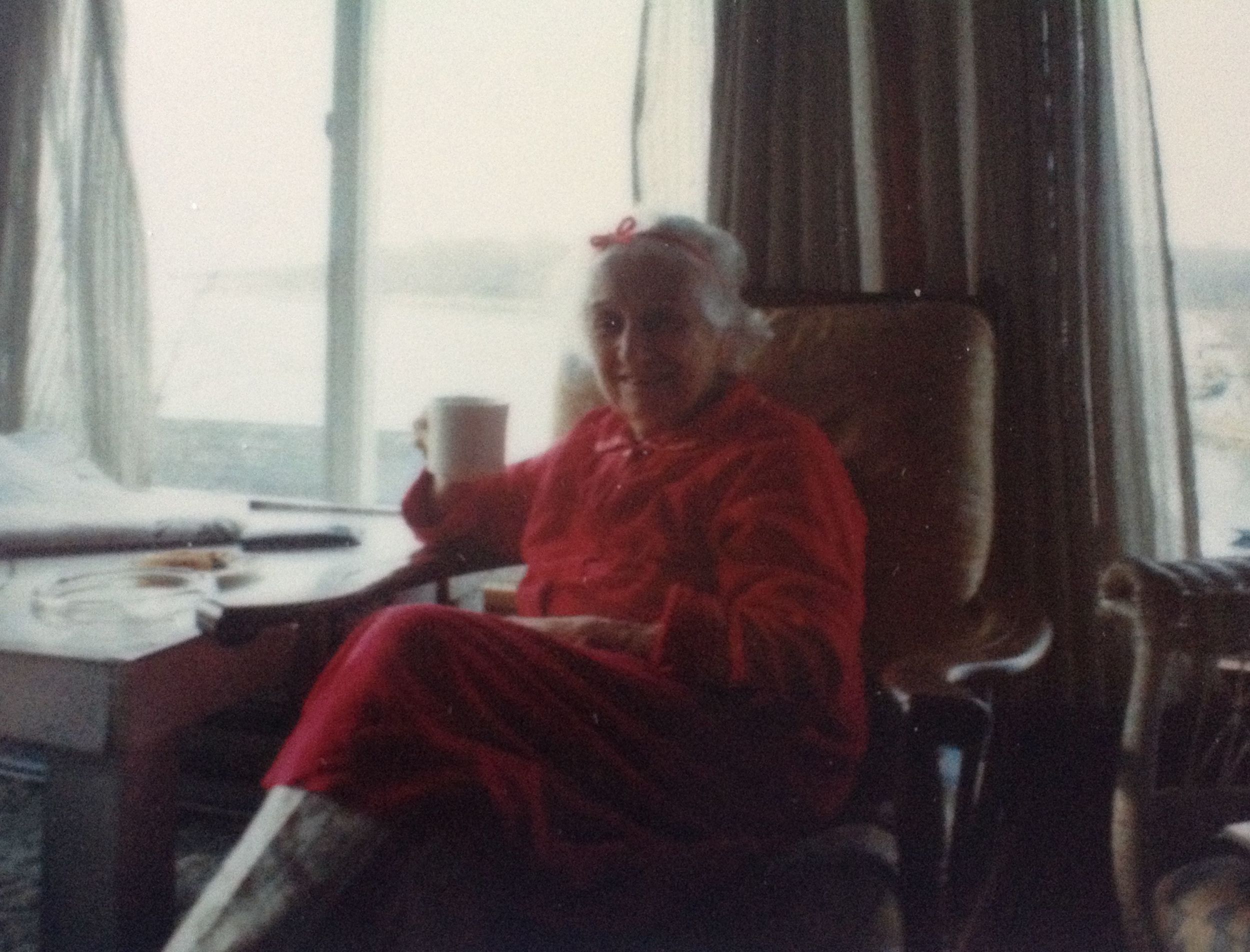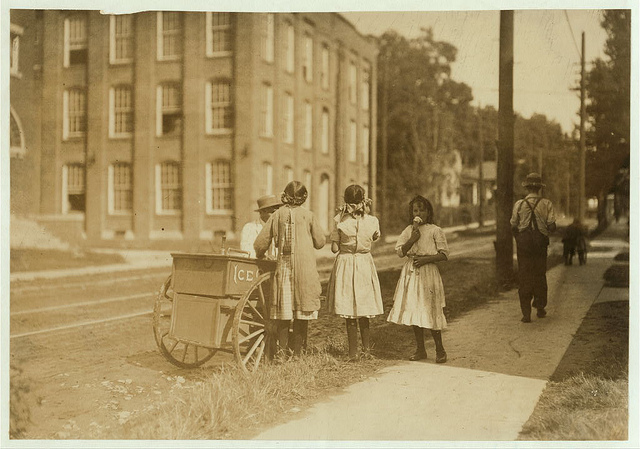 Emily May Beaudry was born on November 6, 1898 in Providence, Rhode Island. She was the second oldest in a family of eight children, two of whom died young. She wore her long dark hair in braids. At school she enjoyed dipping their tips into the inkwell and writing and drawing with them. That got her into trouble, and so did fighting, which she did to protect her younger siblings from bullies.
Emily May Beaudry was born on November 6, 1898 in Providence, Rhode Island. She was the second oldest in a family of eight children, two of whom died young. She wore her long dark hair in braids. At school she enjoyed dipping their tips into the inkwell and writing and drawing with them. That got her into trouble, and so did fighting, which she did to protect her younger siblings from bullies.
The family lived in the Thornton neighborhood of Johnston, a section of Providence known for textile mills (Thornton was named after a village in England, the hometown of one of the mill owners) as well as the natural beauty of Silver Lake and Neutaconkanut Hill. Emily's grandfather's house had a basement kitchen where everyone could put on their skates and walk right outside onto the lake, and the hill was good for sledding. Emily's many aunts were known for their grace on the ice, the way they could skate the grapevine and the reel.
The entire family worked at British Hosiery, one of the local mills. Emily's mother, Gertrude, had grown up in Nottingham, England. Her parents had brought her and her brothers and sisters across the Atlantic with other mill worker families--a hundred and twenty people in all--to work at the hosiery.
In December 1884 the family crossed the North Atlantic from Liverpool on the Cunard steamship Aurania. They traveled in the cramped and difficult conditions of steerage; on that same passage, several decks up, in a different class, was Dr. Dugald Campbell, a Scottish doctor who may-or-may-not be the great-grandfather of J.K. Rowling. The ship made landfall on the eve of Christmas Eve; when Gertrude's father asked the mill owner if they could go to a Catholic Church for midnight mass, the owner was dismayed; he had assumed that, being from England, these immigrants were not Catholic.
Gertrude went on to have eight children of her own; she named her second daughter Emily, after her mother. Emily excelled in school. She was high-spirited, and teachers sometimes scolded her, but she loved school. Although she did well in all her subjects, her favorite was English. She was a great storyteller in a family who loved to tell stories; a dinner at their house would be full of laughter and interruptions, and one person jumping in to finish the story another had started. Books were expensive, and there wasn't yet a library in town, but she read everything she could at school.
When she was in eighth grade, on January 31, 1913, she won the Johnston, Rhode Island medal for "Excellence in Reading."
That was Emily's last year in school. She had to leave before ninth grade, to go to work in the mill. "At the hosiery," she would say, and never with resentment, or a sense of what might have been. She had been a smart, spirited girl, whose education was cut short. She had to help support the family. This was just how it was done; there were no expectations of finishing school. Whatever she may have hoped, whatever her secret dreams may have been, she put them aside and went to the mill every day.
Child labor was common. Long workdays--twelve to fourteen hours--were the norm. Wages were low, and the factories were loud and dangerous, with thundering machinery and poor light. The workers breathed fiber-filled air as they spun thread and wove cloth. The young millworkers perfected the art of spinning. Weaving thread instead of stories...
 Emily was my grandmother. She lived with us from the time I was born, and I called her "Mimi" because I couldn't say "Emily." She told lots of stories, but they were alway full of love--about how she and her sisters Florence, Josie, and Ida would take the ferry from India Point in Providence, down Narragansett Bay. They would always intend to go out to Block Island, but they could never get past Newport--they loved it so much. They'd cram into one small room at Mrs. Richardson's boarding house, and go to Easton's Beach to meet their friends. Or she'd talk about Silver Lake, putting on skates in the basement kitchen and going out onto the ice with her aunts. And her voice would lower, telling how the Grand Trunk Railroad bought up all those houses around the lake, including her grandfather's, and knocked them down, and then the railroad never came through.
Emily was my grandmother. She lived with us from the time I was born, and I called her "Mimi" because I couldn't say "Emily." She told lots of stories, but they were alway full of love--about how she and her sisters Florence, Josie, and Ida would take the ferry from India Point in Providence, down Narragansett Bay. They would always intend to go out to Block Island, but they could never get past Newport--they loved it so much. They'd cram into one small room at Mrs. Richardson's boarding house, and go to Easton's Beach to meet their friends. Or she'd talk about Silver Lake, putting on skates in the basement kitchen and going out onto the ice with her aunts. And her voice would lower, telling how the Grand Trunk Railroad bought up all those houses around the lake, including her grandfather's, and knocked them down, and then the railroad never came through.
I never heard her complain about the mill, or about having to leave school. I never heard her speak of regret. But she kept her medal in her bureau drawer, in the original box. She would sometimes show me. Other times I would sneak into her room and open the drawer and look at her medal, and I'd wonder how it must have felt to be honored for reading, to be an eighth grade scholar, and then to be sent to work at a factory.
Today is her birthday. Happy birthday, Mim...
 I don't have any photos of her as a child, so I sought out pictures of girls with braids who worked in textile mills around the turn of the last century. I am posting two from this site, which contains old photos of child labor between 1908 and 1924. I love these girls, they could so easily be Mim and her sisters.
I don't have any photos of her as a child, so I sought out pictures of girls with braids who worked in textile mills around the turn of the last century. I am posting two from this site, which contains old photos of child labor between 1908 and 1924. I love these girls, they could so easily be Mim and her sisters.


